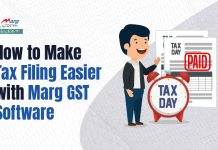Goods and Services Tax (GST) is a consumption-based tax levied on goods and services in India. The GST regime has brought about significant changes in the taxation system and has impacted various industries, including the textile and clothing sector. In this blog, we will discuss the implications of GST on clothes and provide a comprehensive guide to help you understand the various aspects of GST on clothes.
Overview of GST on Clothes
GST is a multi-stage tax that is levied on the value addition at each stage of the supply chain. It has replaced multiple indirect taxes such as Central Excise Duty, Service Tax, VAT, and many others. In the case of clothes, GST is levied on the final value of the product, which includes the cost of raw materials, manufacturing, and distribution.
GST Rates on Clothes
GST rates on clothes depend on the type of cloth and the selling price. As of 2021, the GST rates on clothes are as follows:
No GST on clothes with a sale price below Rs. 1,000
5% GST on clothes with a sale price of Rs. 1,000 or more
12% GST on ready-made garments
18% GST on synthetic and man-made fibers and fabrics
GST on Branded Clothes
Branded clothes are subject to GST, and the rates depend on the type of cloth and the selling price. The GST rate on branded clothes is 5% for clothes with a sale price of Rs. 1,000 or more. For clothes with a sale price below Rs. 1,000, there is no GST.
GST on Second-Hand Clothes
GST is not levied on second-hand clothes, as they are considered to be used goods.
Input Tax Credit (ITC) on Clothes
ITC is the credit that a taxpayer can claim for the GST paid on the purchase of goods or services that are used for business purposes. In the case of clothes, the manufacturer, wholesaler, or retailer can claim ITC on the GST paid on the purchase of raw materials, packaging, and other inputs used in the production of clothes. However, ITC cannot be claimed on the GST paid on inputs such as rent, electricity, and other overheads.
Exemptions from GST on Clothes
While GST is applicable on most types of clothes, there are some exemptions. For example, handloom clothes, khadi, and cotton fabrics are exempt from GST. This exemption is aimed at promoting traditional Indian textiles and supporting the handloom industry.
Moreover, GST is not applicable to clothes that are sold through second-hand dealers or auctions. Clothes that are donated to charitable organizations or are given away for free are also exempt from GST.
GST On Other Products:
Impact of GST on Clothes
The implementation of GST has had a significant impact on the textile and clothing industry. The industry was previously subjected to a complex taxation system with multiple taxes, and the GST has simplified the process. It has brought about transparency and accountability in the supply chain, which has helped to curb tax evasion and streamline the industry.
The GST rates on clothes have also helped to promote the use of natural fibers such as cotton and silk, as they are exempt from or have a lower GST rate than synthetic fibers. This has encouraged the textile industry to focus on sustainable and eco-friendly fabrics, which is a positive development.
Another impact of GST on clothes is the increase in compliance costs for manufacturers, wholesalers, and retailers. They are required to register for GST and file monthly or quarterly returns, which can be a time-consuming and costly process. However, this has also led to greater transparency and accountability in the industry.
In conclusion
GST has had a significant impact on the textile and clothing industry in India. The simplified taxation system has brought about transparency and accountability, while the GST rates have encouraged the use of natural and sustainable fabrics. While compliance costs have increased, the benefits of GST on the industry are significant. It is important for manufacturers, wholesalers, and retailers to be aware of the GST rates and rules to comply with the regulations and avoid penalties.
Frequently Asked Questions
Q:1) What is GST?
A: GST stands for Goods and Services Tax, which is a consumption-based tax levied on goods and services in India. It is a comprehensive tax that has replaced multiple indirect taxes such as Central Excise Duty, Service Tax, VAT, and many others.
Q:2) What is the GST rate on clothes?
A: The GST rate on clothes depends on the type of cloth and the selling price. As of 2021, there is no GST on clothes with a sale price below Rs. 1,000, 5% GST on clothes with a sale price of Rs. 1,000 or more, 12% GST on ready-made garments, and 18% GST on synthetic and man-made fibers and fabrics.
Q:3) Is GST applicable on handloom clothes?
A: No, handloom clothes are exempt from GST.
Q:4) Can I claim Input Tax Credit (ITC) on clothes?
A: Yes, ITC can be claimed on the GST paid on the purchase of raw materials, packaging, and other inputs used in the production of clothes. However, ITC cannot be claimed on the GST paid on inputs such as rent, electricity, and other overheads.
Q:5) Is GST applicable on second-hand clothes?
A: No, the GST is not applicable on second-hand clothes, as they are considered to be used goods.
Q:6) What is the impact of the GST on the clothing industry?
A: The implementation of GST has simplified the taxation system for the textile and clothing industry, and it has brought about transparency and accountability in the supply chain. The GST rates have also helped to promote the use of natural and sustainable fabrics, while compliance costs have increased for manufacturers, wholesalers, and retailers.
Q:7) Do I need to register for GST to sell clothes?
A: Yes, if your turnover exceeds Rs. 40 lakhs (Rs. 10 lakhs for special category states), you need to register for GST and file monthly or quarterly returns.
Q:8) What is the GST rate on branded clothes?
A: Branded clothes are subject to GST, and the rates depend on the type of cloth and the selling price. The GST rate on branded clothes is 5% for clothes with a sale price of Rs. 1,000 or more. For clothes with a sale price below Rs. 1,000, there is no GST.






